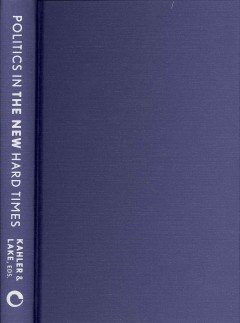 Editors: Miles Kahler and David A. Lake
Editors: Miles Kahler and David A. Lake
Publisher: Cornell University Press – 316 pages
Book Review by: Sonu Chandiram
I was first attracted to read, before anything else, the Afterword in this book by its title: Yet More Hard Times? Reflections on the Great Recession in the Frame of Earlier Hard Times.
This is a key observation on the United States economy in that section of this book: “There has been no great reversal of policy profile. The U.S. remains dependent on cheap credit, high consumption, low saving, and deficit financing.” This is reflective mainly of U.S. consumers in general (that contribute about 70 percent to the gross national product) but also businesses, and particular government entities at all levels: Federal, state, and city-town levels.
Essentially U.S. government policy did not change after the 2008 financial crisis. On the contrary, the government’s debt has exploded by more than $6.95 trillion or over 65 percent in the five and a quarter years Barack Obama has been president, from $10.626 trillion on January 20, 2009 to $17.577 trillion today, April 14, 2014.
Government spending consumes more than 38 percent of GDP, as shown on www.usdebtclock.org, and does not produce any new income. More jobs in government mean few jobs in the private sector. So the U.S. government itself is responsible for lesser national income, less productivity, and fewer jobs in America. A close examination of data from the U.S. Bureau of Labor Statistics will show us that unemployed people in many sectors of the economy are not counted by that agency, projecting falsely low rates of employment in the country.
Besides Obama’s continued deficit-spending now in the trillions of dollars a year, another problem not adequately discussed in the media is U.S. trade deficits with the rest of the world. From 1950 until 2014, the United States has been averaging a monthly trade deficit of $12.384 billion. In February 2014, the U.S. trade deficit with the world was $42.3 billion. (See data on www.tradingeconomics.com).
With respect to China alone, the United States has had a growing trade deficit for decades. In 2003 for example, U.S. trade deficit with that country was $124 billion dollars. That grew to $318 billion in 2013. “Since 1975 the United States has accumulated a total trade deficit with the rest of the world of more than $8 trillion. As a result, we have lost tens of thousands of businesses, millions of jobs…the United States has lost a total of more than 56,000 manufacturing facilities since 2001, “observes a writer on this website: www.pacificcoinexchange.com
Peter A. Gourevitch, who wrote the Afterword, points out some of the causes of the Great Recession of 2008-10:
“Financial lobbies caused not only the bubble that led up to the current crisis (reviewer’s note: this book was published in 2013, which means the crisis has not abated, but continues) but have greatly shaped the policy responses to it. U.S. policy relaxed controls on credit, fiscal policy, housing, taxation, and corporate governance in ways that made for great public and private debt, substantial leveraging, and financial innovations that proved destabilizing.”
He continues: “The United Kingdom, Spain, Ireland, and Iceland pursued similar policies. Germany, China, Japan and other countries did not. Regulation in Europe seems also to have been lax and may have contributed to the bubble…to prevent economic collapse, U.S. financial interests received substantial bailouts, protecting most of the institutions And the wealth of the people who ran them, and the loans of investors around the world who had bought into these risky assets.”
This book is organized into two Parts and 10 chapters, namely:
- Crises and Politics: Is This Time Different?
- Economic Crisis and Global Governance: The Stability of a Globalized World
- Politics in Hard Times Revisited: The 2008-9 Financial Crisis in Emerging Markets
- Partisan Financial Cycles
- The Politics of Hard Times: Fiscal Policy and the Endogeneity of Economic Recessions
- Interests, Coalitions, and Consequences
- The Political Origins of Our Economic Discontents: Contemporary Adjustment Problems in Historical Perspective
- Puzzles from the First Globalization
- Portfolio Politics in the New Hard Times: Crises, Coalitions, and Shareholders in the United States and Germany
- Coalition of Losers: Why Agricultural Protectionism Has Survived During the Great Recession
- Crafting Trade Strategy in the Great Recession: The Obama Administration and the Changing Political Economy of the United States
- Worlds in Collision: Uncertainty and Risk in Hard Times
This book is a true eye opener on the causes of recessions. The basic U.S. government responses to the financial crisis of 2008 were trillions of dollars of bailouts to financial institutions and printing (and electronically creating) trillions of dollars to lower interest rates, measures that have not only left unchanged the unsound foundation of the U.S. economy, but made it shakier. What is the expected outcome? As Gourevitch writes towards end of his Afterword: “…we are more likely to experience a kind of decline a la Japan.”
Contributors:
Suzanne Berger, MIT
J. Lawrence Broz, University of California, San Diego
Peter Cowhey, University of California, San Diego
Peter A. Gourevitch, University of California, San Diego
Stephan Haggard, University of California, San Diego\;
Peter A. Hall, Harvard University
Miles Kahler, University of California, San Diego
Peter J. Katzenstein, Cornell University
Ikuo Kume, Waseda University
David A. Lake, University of California, San Diego
Megumi Naoi, University of California, San Diego
Stephen C. Nelson, Northwestern University
Pablo Pinto, Columbia University
James Shinn, Princeton University







